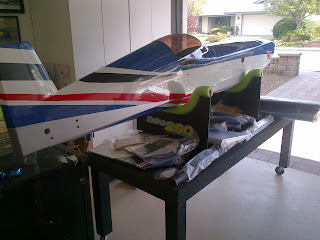So now I am
trial fitting the engine, MTW 90mm drop headers and Prow Flow canisters. I will
have to make some adjustments for the exhaust exits. One exits directly into a cross
member on the fuselage and I don’t want to cut that. I also mounted the
throttle servo with a Sea Craft side mount. I like this set up because the wood
mounts tend to wear over time IMO. It
was easy to place the servo in a position that takes advantage of the shortest
pushrod as possible and as straight as possible with no bends. This to me
eliminates malfunctioning throttle response with nothing to hang up or bend. (Very
Important)
Servos: There are so many options these days but here
is my 2 cents. I like using the
manufactures servos that match the radio I am using. Many giants scale planes have several aftermarket
servos per wing, stab and rudder. I
believe in using the largest HV power servo possible. This way you can eliminate
some servos which means less to go wrong and less weight. The cost in the end
is about the same if not less. The servos I am using are Futaba BLS157 High
Voltage Ultra Torque, they have a torque rating of 513.9oz/in
at 7.4V I will be using 2 per rudder, 1
on each stabilizer and 2 per aileron. If
I used a lower torque servo I would have to add 5 more servos to the plane.
Soooo I mounted
the elevator servos. I used the factory
linkage hardware. This is where Pilot shines; the turn buckles and ball joints
are all 4-40 and nice quality. Note:
I should mention that all the hardware in this pilot kit is great. The parts that I have changed out are for
various functioning reasons and partially because I like the cool bling. These
planes are built and flown all over the world where access too many aftermarket
parts are not available. The hardware included is flying just fine on many
planes.
I like
building planes. I consider the building side my hobby and the flying side a
sport. I love getting tips from other
builders and sharing what I’ve learned.
Here are a couple of tips. Some of you may already know these. 1. I use a sharpie to black out the wood where
the servo mounts. Even though it may not match the covering it will match the
servo grommets giving a clean look to the exposed wood when the servo is mounted. 2. The eyelets that get inserted into the
servo grommets insert up from the bottom. If inserted from the top they can cut
into the wood when the screw is tightened and wear the wood over time. Whenever I see a loose servo that is the
first thing I check.
I am still
trying to decide how I want to do the push/pull on the rudder. I keep staring
at it and nothing definitive has come to mind yet. Next will be the wings servos.
Thanks for
reading.







































